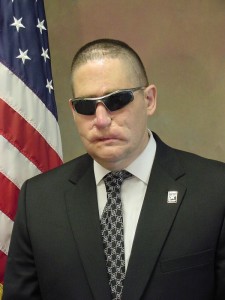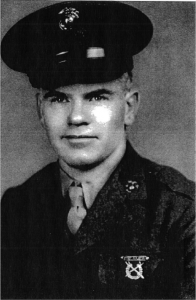
George W. Boffo
Corporal George W. Boffo was awarded the Silver Star for conspicuous gallantry and intrepidity while serving as a Fire Team Leader of Company G, Second Battalion, First Marine Division, during an assault on Okinawa, Ryukyu Islands, on 4 May 1945. Assigned the mission of supporting a tank during an assault on strongly defended enemy caves and emplacements, Corporal Boffo courageously advanced under intense hostile small arms, automatic weapon and mortar fire. Twice wounded, he persisted in his mission and personally located hostile positions and directed the tank’s fire on the enemy, refusing to be evacuated until all the enemy mortars and machine guns were destroyed. By his courage and determination, Corporal Boffo contributed materially to the success of this operation. His devotion to duty throughout was in keeping with the highest traditions of the United States Naval Service
Corporal George W. Boffo was awarded the Silver Star for conspicuous gallantry and intrepidity while serving as a Fire Team Leader of Company G, Second Battalion, First Marine Division, during an assault on Okinawa, Ryukyu Islands, on 4 May 1945. Assigned the mission of supporting a tank during an assault on strongly defended enemy caves and emplacements, Corporal Boffo courageously advanced under intense hostile small arms, automatic weapon and mortar fire. Twice wounded, he persisted in his mission and personally located hostile positions and directed the tank’s fire on the enemy, refusing to be evacuated until all the enemy mortars and machine guns were destroyed. By his courage and determination, Corporal Boffo contributed materially to the success of this operation. His devotion to duty throughout was in keeping with the highest traditions of the United States Naval Service
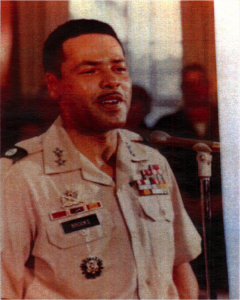
Harry W. Brooks, Jr.
Harry W. Brooks, Jr. enlisted in the United States Army at the age of 19. His career in the Army lasted 29 years and saw him rise in the ranks from private to Major General. Major General Brooks made significant contributions to the Army over the course of his career, serving in Vietnam, Germany, Korea and the United States. Included in his assignments was that of Commander, 25th Infantry Division in Hawaii. Prominent among his many accomplishments was the role he played in bringing harmony to race relations in the Army. As a Brigadier General Harry Brooks was the first Army Director of Equal Opportunity and Race Relations. Major General Brook’s military decorations include the Distinguished Service Medal, Legion of Merit (with Oak Leaf Cluster), Bronze Star Medal (with Oak Leaf Cluster), Air Medal (with six Oak Leaf Clusters), and the Meritorious Service Medal, as well as numerous other service medals. In his civilian life he has continued his path of service and achievement. In 1990 his company was designated the Black Enterprise Company of the Year. In 1999 he was recognized by the Department of Commerce as the Minority Business Enterprise of the Year. He is also the recipient of the Kiwanis International Award, the NAACP Meritorious Service and Freedom Award, the Pittsburgh Courier Top Hat Award and the Sagamore of the Wabash. His bust is on display at the War Memorial in Indianapolis.
Harry W. Brooks, Jr. enlisted in the United States Army at the age of 19. His career in the Army lasted 29 years and saw him rise in the ranks from private to Major General. Major General Brooks made significant contributions to the Army over the course of his career, serving in Vietnam, Germany, Korea and the United States. Included in his assignments was that of Commander, 25th Infantry Division in Hawaii. Prominent among his many accomplishments was the role he played in bringing harmony to race relations in the Army. As a Brigadier General Harry Brooks was the first Army Director of Equal Opportunity and Race Relations. Major General Brook’s military decorations include the Distinguished Service Medal, Legion of Merit (with Oak Leaf Cluster), Bronze Star Medal (with Oak Leaf Cluster), Air Medal (with six Oak Leaf Clusters), and the Meritorious Service Medal, as well as numerous other service medals. In his civilian life he has continued his path of service and achievement. In 1990 his company was designated the Black Enterprise Company of the Year. In 1999 he was recognized by the Department of Commerce as the Minority Business Enterprise of the Year. He is also the recipient of the Kiwanis International Award, the NAACP Meritorious Service and Freedom Award, the Pittsburgh Courier Top Hat Award and the Sagamore of the Wabash. His bust is on display at the War Memorial in Indianapolis.
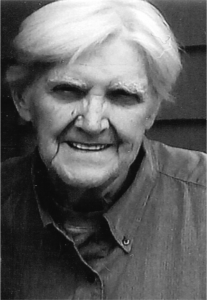
Charles W. Green
Sergeant Charles Green was awarded the Silver Star for gallantry in action when he distinguished himself by heroic actions on 22 July 1969 in the Republic of Vietnam. While established in defensive positions, elements of his unit, Company D, 1st Battalion, 27th Infantry, 25th Infantry Division, came under heavy attack by a much larger Viet Cong force. Sergeant Green was wounded in the enemy’s initial massive attack when the enemy detonated a large claymore mine. He, nevertheless, continued to place heavy fire on the attacking enemy force. Wounded a second time, he refused treatment or evacuation and resumed his relentless fire on the enemy. A large rocket propelled grenade wounded Sergeant Green for the third time. Although now very seriously injured he continued fighting and was forced to be evacuated because of the seriousness of his multiple wounds. His valorous actions contributed immeasurably to his unit successfully repelling the Viet Cong attack and the defeat of the hostile force. Sergeant Green’s bravery, aggressiveness, and devotion to duty are in keeping with the highest traditions of the military service and reflect great credit upon himself, his unit, the 25th Infantry Division and the United States Army.
Sergeant Charles Green was awarded the Silver Star for gallantry in action when he distinguished himself by heroic actions on 22 July 1969 in the Republic of Vietnam. While established in defensive positions, elements of his unit, Company D, 1st Battalion, 27th Infantry, 25th Infantry Division, came under heavy attack by a much larger Viet Cong force. Sergeant Green was wounded in the enemy’s initial massive attack when the enemy detonated a large claymore mine. He, nevertheless, continued to place heavy fire on the attacking enemy force. Wounded a second time, he refused treatment or evacuation and resumed his relentless fire on the enemy. A large rocket propelled grenade wounded Sergeant Green for the third time. Although now very seriously injured he continued fighting and was forced to be evacuated because of the seriousness of his multiple wounds. His valorous actions contributed immeasurably to his unit successfully repelling the Viet Cong attack and the defeat of the hostile force. Sergeant Green’s bravery, aggressiveness, and devotion to duty are in keeping with the highest traditions of the military service and reflect great credit upon himself, his unit, the 25th Infantry Division and the United States Army.
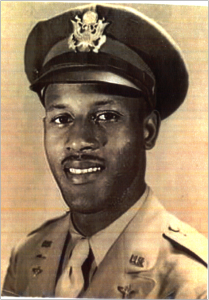
Charles B. Hall
Major Hall was born in Brazil, Indiana, on 25 August 1920 and graduated from Brazil High School in the spring of 1938. While enrolled in the pre-med program at Eastern Illinois State Teachers College, on a football and track scholarship, he answered his country’s call and joined the Army. Motivated to be a pilot he was stationed at Tuskegee Air Field, Alabama and became a member of the now famous Tuskegee Airmen. On 2 July 1943, then 1st Lieutenant Hall was providing defensive cover for U.S. bombers over Italy. The bombers were attacked by two German Focke-Wulf 190 fighters. 1st Lieutenant Hall immediately attacked the approaching enemy aircraft, shot one down and chased the other away. For his action against a superior German force 1st Lieutenant Hall was awarded the Distinguished Flying Cross. With the downing of that German fighter Charles Hall became the first of the Tuskegee airmen to shot down an enemy aircraft and before his overseas tour ended he had shot down three. Upon his return to the United States, Major Hall taught flight operations at Tuskegee Air Field and upon completion of that mission toured the U.S. selling War Bonds. Major Charles B. Hall’s actions during World War II, in combat and at home, brought great credit upon himself, the United States Army Air Corps and the United States of America.
Major Hall was born in Brazil, Indiana, on 25 August 1920 and graduated from Brazil High School in the spring of 1938. While enrolled in the pre-med program at Eastern Illinois State Teachers College, on a football and track scholarship, he answered his country’s call and joined the Army. Motivated to be a pilot he was stationed at Tuskegee Air Field, Alabama and became a member of the now famous Tuskegee Airmen. On 2 July 1943, then 1st Lieutenant Hall was providing defensive cover for U.S. bombers over Italy. The bombers were attacked by two German Focke-Wulf 190 fighters. 1st Lieutenant Hall immediately attacked the approaching enemy aircraft, shot one down and chased the other away. For his action against a superior German force 1st Lieutenant Hall was awarded the Distinguished Flying Cross. With the downing of that German fighter Charles Hall became the first of the Tuskegee airmen to shot down an enemy aircraft and before his overseas tour ended he had shot down three. Upon his return to the United States, Major Hall taught flight operations at Tuskegee Air Field and upon completion of that mission toured the U.S. selling War Bonds. Major Charles B. Hall’s actions during World War II, in combat and at home, brought great credit upon himself, the United States Army Air Corps and the United States of America.
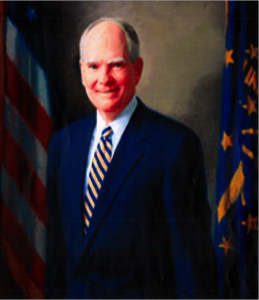
Joseph E. Kernan
Joseph E. Kernan has provided continuous support to the military veterans of Indiana over the course of his lifetime. After graduating from Notre Dame University, he joined the Navy as a Naval Flight Officer and was stationed aboard the USS Kitty Hawk where he deployed to Vietnam in 1972 as a Reconnaissance Navigator. In May of 1972, Lieutenant Kernan’s plane was shot down while on a mission over North Vietnam. Injured, he ejected before the plane crashed and was captured and spent the next eleven months as a Prisoner of War in the “Hanoi Hilton.” He was liberated and repatriated to the US in 1973. For his actions while in the Navy Lieutenant Kernan was awarded the Distinguished Flying Cross, the Purple Heart (two awards), the Air Medal (with a gold star for 20 combat missions flown), the Navy Achievement Medal and the Navy Commendation Medal. Upon his return to civilian life Joseph Kernan continued his support of all things military working with the Indiana Department of Veterans Affairs and the Indiana War Memorial. He continued to pursue civic duties as Controller of South Bend, and followed that by becoming the Mayor of the City of South Bend. Joseph Kernan was elected Lieutenant Governor of Indiana in 1996, was reelected in 2000, and became the 48th Governor of Indiana when Governor O’Bannon died in office in September 2003.
Joseph E. Kernan has provided continuous support to the military veterans of Indiana over the course of his lifetime. After graduating from Notre Dame University, he joined the Navy as a Naval Flight Officer and was stationed aboard the USS Kitty Hawk where he deployed to Vietnam in 1972 as a Reconnaissance Navigator. In May of 1972, Lieutenant Kernan’s plane was shot down while on a mission over North Vietnam. Injured, he ejected before the plane crashed and was captured and spent the next eleven months as a Prisoner of War in the “Hanoi Hilton.” He was liberated and repatriated to the US in 1973. For his actions while in the Navy Lieutenant Kernan was awarded the Distinguished Flying Cross, the Purple Heart (two awards), the Air Medal (with a gold star for 20 combat missions flown), the Navy Achievement Medal and the Navy Commendation Medal. Upon his return to civilian life Joseph Kernan continued his support of all things military working with the Indiana Department of Veterans Affairs and the Indiana War Memorial. He continued to pursue civic duties as Controller of South Bend, and followed that by becoming the Mayor of the City of South Bend. Joseph Kernan was elected Lieutenant Governor of Indiana in 1996, was reelected in 2000, and became the 48th Governor of Indiana when Governor O’Bannon died in office in September 2003.
Jeffrey E. Mittman
As an Army infantryman, Master Sergeant Jeffrey Mittman was serving his fourth combat tour in Iraq. He and his four-member patrol were attacked by enemy combatants when an improvised explosive device was launched through the driver’s side of the Humvee he was driving. The bomb destroyed all of his facial bones and left him unconscious for a month. He lost his nose, lips, left eye, and central vision in his right eye, most of his teeth and his right hand and arm sustained irreparable damage. He underwent more than 40 surgeries to reconstruct his face. Saying the Army didn’t “need infantrymen who can’t see and have no trigger finger,” Master Sergeant Mittman retired from the Army. Master Sergeant Mittman’s military decorations include three awards of the Bronze Star, the Purple Heart, the Meritorious Service Medal, seven awards of the Army Commendation Medal, eight awards of the Army Achievement Medal and five awards of the Army Good Conduct Medal, plus numerous campaign and service medals. His achievements in civilian life have been no less remarkable. He meets with individual veterans, their families, and veteran audiences to assist those with similar injuries, particularly blindness, and carry the message of hope to all. His long list of speaking engagements and veteran’s assistance include: the American Legion National Commander’s Dinner, Crown Hill National Cemetery Memorial Day Speech, Military Family Research Institute Conference, New Palestine High School Veterans Day and Indiana School for the Blind and Visually Impaired Commencement, to list just a few.
As an Army infantryman, Master Sergeant Jeffrey Mittman was serving his fourth combat tour in Iraq. He and his four-member patrol were attacked by enemy combatants when an improvised explosive device was launched through the driver’s side of the Humvee he was driving. The bomb destroyed all of his facial bones and left him unconscious for a month. He lost his nose, lips, left eye, and central vision in his right eye, most of his teeth and his right hand and arm sustained irreparable damage. He underwent more than 40 surgeries to reconstruct his face. Saying the Army didn’t “need infantrymen who can’t see and have no trigger finger,” Master Sergeant Mittman retired from the Army. Master Sergeant Mittman’s military decorations include three awards of the Bronze Star, the Purple Heart, the Meritorious Service Medal, seven awards of the Army Commendation Medal, eight awards of the Army Achievement Medal and five awards of the Army Good Conduct Medal, plus numerous campaign and service medals. His achievements in civilian life have been no less remarkable. He meets with individual veterans, their families, and veteran audiences to assist those with similar injuries, particularly blindness, and carry the message of hope to all. His long list of speaking engagements and veteran’s assistance include: the American Legion National Commander’s Dinner, Crown Hill National Cemetery Memorial Day Speech, Military Family Research Institute Conference, New Palestine High School Veterans Day and Indiana School for the Blind and Visually Impaired Commencement, to list just a few.
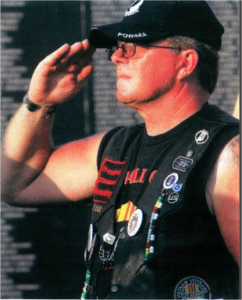
Stephen P. Moore
Stephen P. Moore served in the United States Airforce for six years, leaving the service as a Staff Sergeant. While he may have left the service in 1979, he continues his support for the military and for military veterans. He is a lifetime member of both the American Legion and Disabled American Veterans. A lifelong resident of Michigan City, Indiana, Stephen Moore has led numerous activities to assist Hoosier veterans. In 1997 he raised the funds and organized a trip to the Vietnam Memorial Wall for a group of veterans that had never been able to go. He has continued that project yearly. In 2001 the group’s size caused Stephen Moore to organize his group into a 501(c)3, corporation known as the “Wall Gang.” The Wall Gang’s activities include a food pantry for homeless or needy veterans and doing home repair or adding ramps to the houses of elderly or handicapped veterans. Annually, under his leadership, the group conducts Veteran’s Day programs for nursing homes and public schools across northern Indiana. Also since 2004, Stephen Moore organizes and personally rides his motorcycle to Sacramento, California, where he picks up other riders and leads them to “Rolling Thunder” in Washington, D.C. Along the way the riders stop at Veteran’s Homes and nursing homes to encourage and bless veterans and continue on until they reach D.C. where they lay a wreath at the Tomb of the Unknown Soldier.
Stephen P. Moore served in the United States Airforce for six years, leaving the service as a Staff Sergeant. While he may have left the service in 1979, he continues his support for the military and for military veterans. He is a lifetime member of both the American Legion and Disabled American Veterans. A lifelong resident of Michigan City, Indiana, Stephen Moore has led numerous activities to assist Hoosier veterans. In 1997 he raised the funds and organized a trip to the Vietnam Memorial Wall for a group of veterans that had never been able to go. He has continued that project yearly. In 2001 the group’s size caused Stephen Moore to organize his group into a 501(c)3, corporation known as the “Wall Gang.” The Wall Gang’s activities include a food pantry for homeless or needy veterans and doing home repair or adding ramps to the houses of elderly or handicapped veterans. Annually, under his leadership, the group conducts Veteran’s Day programs for nursing homes and public schools across northern Indiana. Also since 2004, Stephen Moore organizes and personally rides his motorcycle to Sacramento, California, where he picks up other riders and leads them to “Rolling Thunder” in Washington, D.C. Along the way the riders stop at Veteran’s Homes and nursing homes to encourage and bless veterans and continue on until they reach D.C. where they lay a wreath at the Tomb of the Unknown Soldier.

Shirley M. Ohta
Shirley M. Ohta was born in Wailuku, Hawaii, but since 2000 has made her home in Floyds Knobs, Indiana. She retired from the Army in 1987 in the rank of Colonel. She continues to serve Southern Indiana and its military veteran community. While on active duty, Colonel Ohta served in the United States and Vietnam. Her military decorations include the Bronze Star, Meritorious Service Medal (with one oak leaf cluster), Army Commendation Medal and various service and overseas medals. She is currently the owner and CEO of Eagle Steel Products, Inc.
In recent years Colonel Ohta has served on the Boards of One Southern Indiana, Community Foundation of Southern Indiana, Hospice of Southern Indiana, and American Legion Post 42. She also served as the VA Medical Center Associate VA Volunteer Services Representative at the Louisville VA Hospital. Colonel Ohta is a VA community volunteer working to gather and distribute furniture and household items to homeless veterans transitioning into housing. She is the past 8th District American Legion Adjutant. In 2012 she was named the Department of Indiana American Legion Auxiliary Woman of the Year and in 2014 she received the Congressional Veterans Commendation from Congressman Todd Young.
Shirley M. Ohta was born in Wailuku, Hawaii, but since 2000 has made her home in Floyds Knobs, Indiana. She retired from the Army in 1987 in the rank of Colonel. She continues to serve Southern Indiana and its military veteran community. While on active duty, Colonel Ohta served in the United States and Vietnam. Her military decorations include the Bronze Star, Meritorious Service Medal (with one oak leaf cluster), Army Commendation Medal and various service and overseas medals. She is currently the owner and CEO of Eagle Steel Products, Inc.
In recent years Colonel Ohta has served on the Boards of One Southern Indiana, Community Foundation of Southern Indiana, Hospice of Southern Indiana, and American Legion Post 42. She also served as the VA Medical Center Associate VA Volunteer Services Representative at the Louisville VA Hospital. Colonel Ohta is a VA community volunteer working to gather and distribute furniture and household items to homeless veterans transitioning into housing. She is the past 8th District American Legion Adjutant. In 2012 she was named the Department of Indiana American Legion Auxiliary Woman of the Year and in 2014 she received the Congressional Veterans Commendation from Congressman Todd Young.
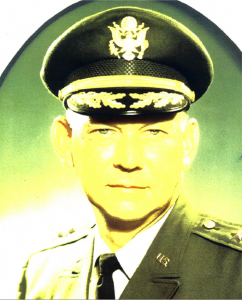
John N. Owens
Major General John N. Owens was born in Louisville, Kentucky and moved with his family to their home in Salem, Indiana at the age of four. He was, upon that move, a lifelong resident of Indiana, graduating from Salem High School in 1938 and enlisting in the Army at Fort Benjamin Harrison in 1942. John Owens spent the next thirty-eight years in the service of his country as a member of the active Army and the Indiana National Guard, retiring from the Indiana National Guard as the state Adjutant General in 1980. His duty assignments were numerous and included duty with the U.S. Seventh Army in Germany during World War II. After advancing through the ranks to Brigadier General with the Indiana National Guard, General Owens was appointed in 1969, by Governor Whitcomb, to become the Indiana National Guard Adjutant General. In his work as the Indiana Adjutant General, he continued to support and mentor Hoosier guard members and veterans across the state. Upon completion of his tour as the state Adjutant General, Major General Owens became the United States Property and Fiscal Officer for Indiana. His military decorations include the Legion of Merit, Good Conduct Medal, Army Achievement Medal, Indiana Distinguished Service Medal, and Sagamore of the Wabash, among many others. Across Indiana, Major General Owens supported veterans through active participation in various organizations including the National Guard Association of the United States, Jackson County Mental Health Association, the Indiana National Guard Association and the Association of the United States Army.
Major General John N. Owens was born in Louisville, Kentucky and moved with his family to their home in Salem, Indiana at the age of four. He was, upon that move, a lifelong resident of Indiana, graduating from Salem High School in 1938 and enlisting in the Army at Fort Benjamin Harrison in 1942. John Owens spent the next thirty-eight years in the service of his country as a member of the active Army and the Indiana National Guard, retiring from the Indiana National Guard as the state Adjutant General in 1980. His duty assignments were numerous and included duty with the U.S. Seventh Army in Germany during World War II. After advancing through the ranks to Brigadier General with the Indiana National Guard, General Owens was appointed in 1969, by Governor Whitcomb, to become the Indiana National Guard Adjutant General. In his work as the Indiana Adjutant General, he continued to support and mentor Hoosier guard members and veterans across the state. Upon completion of his tour as the state Adjutant General, Major General Owens became the United States Property and Fiscal Officer for Indiana. His military decorations include the Legion of Merit, Good Conduct Medal, Army Achievement Medal, Indiana Distinguished Service Medal, and Sagamore of the Wabash, among many others. Across Indiana, Major General Owens supported veterans through active participation in various organizations including the National Guard Association of the United States, Jackson County Mental Health Association, the Indiana National Guard Association and the Association of the United States Army.
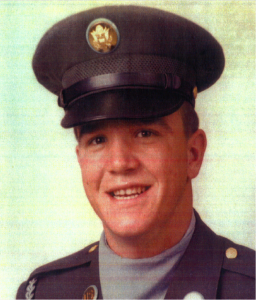
Donald R. Rigney
After a little over two and a half years of active duty in the United States Army, Sergeant Donald Rigney was honorably discharged and moved back to Indianapolis where he worked until his retirement some twenty-five years later. As Specialist Fourth Class, Donald Rigney was awarded the Silver Star for gallantry in action against a hostile force during the Tet Offensive in 1968 in Vietnam. He was presented the decoration at Fort Benjamin Harrison on October 15, 1969. In addition to the Silver Star, Sergeant Rigney’s other decorations include the Bronze Star, Purple Heart (with one oak leaf cluster), Air Medal (with one oak leaf cluster), Army Commendation Medal and Combat Infantryman’s Badge. In support of veteran’s activities and the community Donald Rigney Is a member of the National Purple Heart Organization, Disabled American Veterans, Veterans of Foreign Wars, American Legion, Scottish Rite and others.
After a little over two and a half years of active duty in the United States Army, Sergeant Donald Rigney was honorably discharged and moved back to Indianapolis where he worked until his retirement some twenty-five years later. As Specialist Fourth Class, Donald Rigney was awarded the Silver Star for gallantry in action against a hostile force during the Tet Offensive in 1968 in Vietnam. He was presented the decoration at Fort Benjamin Harrison on October 15, 1969. In addition to the Silver Star, Sergeant Rigney’s other decorations include the Bronze Star, Purple Heart (with one oak leaf cluster), Air Medal (with one oak leaf cluster), Army Commendation Medal and Combat Infantryman’s Badge. In support of veteran’s activities and the community Donald Rigney Is a member of the National Purple Heart Organization, Disabled American Veterans, Veterans of Foreign Wars, American Legion, Scottish Rite and others.
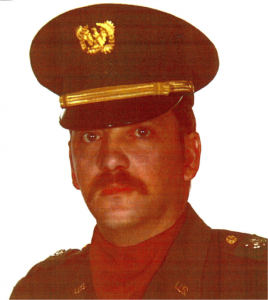
Craig L. Rongey
Warrant Officer Craig L. Rongey was awarded the Distinguished Flying Cross for heroism while participating in an aerial flight on 6 September 1969, in the Republic of Vietnam. Warrant Officer Rongey was the pilot of a light, unarmed, observation helicopter when he was notified that a convoy was under ambush. Warrant Officer Rongey flew to the contact area and was fired upon by enemy automatic weapons and machine guns. Disregarding his personal safety, he remained over the area adjusting the friendly supporting fire for over two hours until the insurgents retreated. His courageous initiative and exemplary professionalism significantly contributed to saving friendly lives and the death of ten insurgents. Warrant Officer Rongey’s actions are in keeping with the finest traditions of the military service and reflect great credit upon himself, the 1st Infantry Division and the United States Army. In addition to the Distinguished Flying Cross, Warrant Officer Rongey was also awarded the Bronze Star Medal, nine awards of the Air Medal (including one for Valor), and numerous other service and campaign medals. Warrant Officer Rongey recorded 369 combat flight hours during his tour in Vietnam.
Warrant Officer Craig L. Rongey was awarded the Distinguished Flying Cross for heroism while participating in an aerial flight on 6 September 1969, in the Republic of Vietnam. Warrant Officer Rongey was the pilot of a light, unarmed, observation helicopter when he was notified that a convoy was under ambush. Warrant Officer Rongey flew to the contact area and was fired upon by enemy automatic weapons and machine guns. Disregarding his personal safety, he remained over the area adjusting the friendly supporting fire for over two hours until the insurgents retreated. His courageous initiative and exemplary professionalism significantly contributed to saving friendly lives and the death of ten insurgents. Warrant Officer Rongey’s actions are in keeping with the finest traditions of the military service and reflect great credit upon himself, the 1st Infantry Division and the United States Army. In addition to the Distinguished Flying Cross, Warrant Officer Rongey was also awarded the Bronze Star Medal, nine awards of the Air Medal (including one for Valor), and numerous other service and campaign medals. Warrant Officer Rongey recorded 369 combat flight hours during his tour in Vietnam.
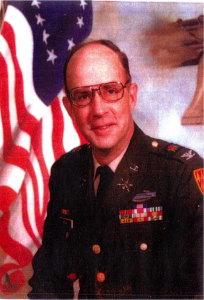
Joseph D. Ryan
While on a training mission with US forces near Grafenwohr, West Germany on 9 February 1960, First Lieutenant Joseph Ryan arrived on the scene of a burning U.S. Army M-48 Tank. With total disregard for his own safety he donned a gas mask, entered the burning tank through the tank turret, personally retrieved live tank ammunition from the tank and passed it to others outside of the burning tank for removal to safety. Persisting in his efforts, he remained in the burning tank until the batteries of the vehicle had been disconnected thus avoiding additional fire and damage to the tank. For his quick and courageous action, First Lieutenant Joseph Ryan was awarded the Soldier’s Medal, the Army’s highest award for heroic action in a non-combat environment. His heroic efforts resulted in not only the saving of government property but also the prevention of the possible death or injury to other personnel. His actions were in the most cherished traditions of the United States Army and reflect distinct credit upon himself and the military service. After returning to civilian life Colonel, Retired, Joseph Ryan continued to provide for veterans across the nation and state. He was personally instrumental in assisting in legislation which led to the passing of the popular Tricare for Life bill, which provides health care coverage for veterans across the nation. He helped form the White River Chapter of the Military Officers Association of America and served as its President. He was also instrumental in establishment of a facility in Indianapolis for families visiting their wounded sons and daughters, husbands and wives, at the Roudabush VA Center.
While on a training mission with US forces near Grafenwohr, West Germany on 9 February 1960, First Lieutenant Joseph Ryan arrived on the scene of a burning U.S. Army M-48 Tank. With total disregard for his own safety he donned a gas mask, entered the burning tank through the tank turret, personally retrieved live tank ammunition from the tank and passed it to others outside of the burning tank for removal to safety. Persisting in his efforts, he remained in the burning tank until the batteries of the vehicle had been disconnected thus avoiding additional fire and damage to the tank. For his quick and courageous action, First Lieutenant Joseph Ryan was awarded the Soldier’s Medal, the Army’s highest award for heroic action in a non-combat environment. His heroic efforts resulted in not only the saving of government property but also the prevention of the possible death or injury to other personnel. His actions were in the most cherished traditions of the United States Army and reflect distinct credit upon himself and the military service. After returning to civilian life Colonel, Retired, Joseph Ryan continued to provide for veterans across the nation and state. He was personally instrumental in assisting in legislation which led to the passing of the popular Tricare for Life bill, which provides health care coverage for veterans across the nation. He helped form the White River Chapter of the Military Officers Association of America and served as its President. He was also instrumental in establishment of a facility in Indianapolis for families visiting their wounded sons and daughters, husbands and wives, at the Roudabush VA Center.
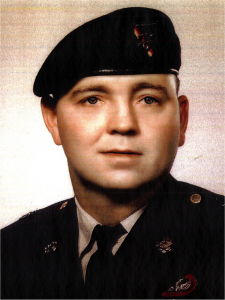
Ronald E. Smith
For gallantry in action, Sergeant First Class Ronald E. Smith was awarded the Silver Star while assigned to the Command Control Detachment, 5th Special Forces Group (Airborne), 1st Special Forces, Republic of Vietnam. SFC Smith was a member of a long-range reconnaissance team on a mission deep inside enemy controlled territory on 28 November 1970. The team was landed and immediately received intense fire from a hostile force approximately 100 meters from their landing site. SFC Smith returned fire and immediately called for air support that enabled the team to break contact with the enemy and move down a heavily travelled trail. The enemy followed and SFC Smith’s team deployed three anti-personnel mines to delay the enemy’s approach. After the third mine exploded less than 100 meters behind the team, they once again came under intense enemy fire. Disregarding his own safety and exposing himself to enemy fire, SFC Smith began to call for air support. The team was successful in killing several of the attacking enemy. The enemy continued a relentless attack and again SFC Smith exposed himself to intense fire in order to call for air support. He moved to a completely exposed position to mark enemy targets. Suddenly he was hit by hostile fire and fell to the ground. The air support SFC Smith had called for arrived and was able to allow the team to withdraw and eventually be extracted. SFC Smith’s gallantry and self-sacrifice were in keeping with the highest traditions of the military service and reflect great credit upon him, his unit and the United States Army. SFC Ronald Smith was declared Missing in Action and on 23 December 1970 a Board met to review his status and changed it to Killed in Action/Body Not Recovered.
For gallantry in action, Sergeant First Class Ronald E. Smith was awarded the Silver Star while assigned to the Command Control Detachment, 5th Special Forces Group (Airborne), 1st Special Forces, Republic of Vietnam. SFC Smith was a member of a long-range reconnaissance team on a mission deep inside enemy controlled territory on 28 November 1970. The team was landed and immediately received intense fire from a hostile force approximately 100 meters from their landing site. SFC Smith returned fire and immediately called for air support that enabled the team to break contact with the enemy and move down a heavily travelled trail. The enemy followed and SFC Smith’s team deployed three anti-personnel mines to delay the enemy’s approach. After the third mine exploded less than 100 meters behind the team, they once again came under intense enemy fire. Disregarding his own safety and exposing himself to enemy fire, SFC Smith began to call for air support. The team was successful in killing several of the attacking enemy. The enemy continued a relentless attack and again SFC Smith exposed himself to intense fire in order to call for air support. He moved to a completely exposed position to mark enemy targets. Suddenly he was hit by hostile fire and fell to the ground. The air support SFC Smith had called for arrived and was able to allow the team to withdraw and eventually be extracted. SFC Smith’s gallantry and self-sacrifice were in keeping with the highest traditions of the military service and reflect great credit upon him, his unit and the United States Army. SFC Ronald Smith was declared Missing in Action and on 23 December 1970 a Board met to review his status and changed it to Killed in Action/Body Not Recovered.
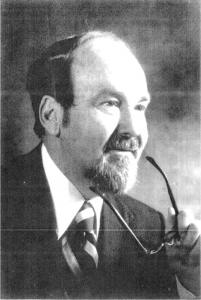
Claude M. Spilman, Jr.
First Lieutenant Claude M. Spilman, Jr. was awarded the Silver Star for gallantry in action on 8 October 1944 in Germany. Lieutenant Spilman was serving as a platoon leader with an infantry regiment engaged in an assault upon enemy fortified positions. While moving up to attack, the battalion to which Lieutenant Spilman was assigned was halted by two enemy tanks accompanied by infantrymen. The Germans held commanding terrain and it was difficult for either tanks, tank destroyers, or bazooka teams to advance. Displaying outstanding fortitude and great personal courage, Lieutenant Spilman crawled with a bazooka team to a house from which he hoped to fire on the enemy tanks. One of the tanks began advancing toward the house and the bazooka team withdrew. Unhesitatingly, he loaded and fired the bazooka himself, crippling the tank. A shell from one of the tank guns scored a hit on the building that Lieutenant Spilman was occupying, seriously injuring him. However, the effective fire Lieutenant Spilman had delivered on the tank injured the tank commander and, without his leadership, the enemy force withdrew, enabling the battalion to continue the attack. Lieutenant Spilman’s actions brought great credit upon himself, the military, his unit and the United States Army.
First Lieutenant Claude M. Spilman, Jr. was awarded the Silver Star for gallantry in action on 8 October 1944 in Germany. Lieutenant Spilman was serving as a platoon leader with an infantry regiment engaged in an assault upon enemy fortified positions. While moving up to attack, the battalion to which Lieutenant Spilman was assigned was halted by two enemy tanks accompanied by infantrymen. The Germans held commanding terrain and it was difficult for either tanks, tank destroyers, or bazooka teams to advance. Displaying outstanding fortitude and great personal courage, Lieutenant Spilman crawled with a bazooka team to a house from which he hoped to fire on the enemy tanks. One of the tanks began advancing toward the house and the bazooka team withdrew. Unhesitatingly, he loaded and fired the bazooka himself, crippling the tank. A shell from one of the tank guns scored a hit on the building that Lieutenant Spilman was occupying, seriously injuring him. However, the effective fire Lieutenant Spilman had delivered on the tank injured the tank commander and, without his leadership, the enemy force withdrew, enabling the battalion to continue the attack. Lieutenant Spilman’s actions brought great credit upon himself, the military, his unit and the United States Army.
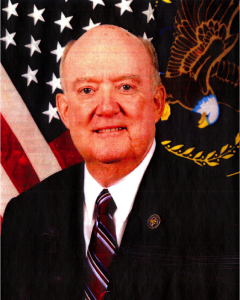
John A. Topper
For heroism in connection with military operations against a hostile force in the Republic of Vietnam, Captain John Topper was awarded the Bronze Star for Valor. While commanding Company A, 1st Battalion (Mechanized), 50th Infantry, in action against a hostile force near Hoa Tan, Republic of Vietnam on 12 October 1967 Captain Topper exposed himself to hostile fire as he directed and controlled the covering fire for his men, enabling an element of his unit to successfully neutralize the enemy. His outstanding action inflicted numerous casualties on the hostile force and contributed greatly to the successful completion of his unit’s mission. Captain Topper’s display of personal bravery and devotion to duty is in keeping with the highest tradition of the military service, and reflects great credit upon himself, his unit, and the United States Army. After his active duty tour, John Topper joined the U.S. Army Reserve and continued to serve with the Reserves until his retirement in September 1993, in the rank of Colonel. Colonel Topper continues to serve Reserves and veterans today as an Army Reserve Ambassador. In 1997 John Topper was selected by the United States Small Business Administration as the Small Business Advocate of the Year due to his efforts in helping veteran-owned small business in the Rocky Mountain Region. He is currently President-elect for the Indiana Department Reserve Officer Association. Colonel Topper’s military decorations include a second award of the Bronze Star, two awards of the Legion of Merit, the Purple Heart, two awards of the Meritorious Service Medal, two awards of the Air Medal, and two awards of the Army Commendation Medal.
For heroism in connection with military operations against a hostile force in the Republic of Vietnam, Captain John Topper was awarded the Bronze Star for Valor. While commanding Company A, 1st Battalion (Mechanized), 50th Infantry, in action against a hostile force near Hoa Tan, Republic of Vietnam on 12 October 1967 Captain Topper exposed himself to hostile fire as he directed and controlled the covering fire for his men, enabling an element of his unit to successfully neutralize the enemy. His outstanding action inflicted numerous casualties on the hostile force and contributed greatly to the successful completion of his unit’s mission. Captain Topper’s display of personal bravery and devotion to duty is in keeping with the highest tradition of the military service, and reflects great credit upon himself, his unit, and the United States Army. After his active duty tour, John Topper joined the U.S. Army Reserve and continued to serve with the Reserves until his retirement in September 1993, in the rank of Colonel. Colonel Topper continues to serve Reserves and veterans today as an Army Reserve Ambassador. In 1997 John Topper was selected by the United States Small Business Administration as the Small Business Advocate of the Year due to his efforts in helping veteran-owned small business in the Rocky Mountain Region. He is currently President-elect for the Indiana Department Reserve Officer Association. Colonel Topper’s military decorations include a second award of the Bronze Star, two awards of the Legion of Merit, the Purple Heart, two awards of the Meritorious Service Medal, two awards of the Air Medal, and two awards of the Army Commendation Medal.
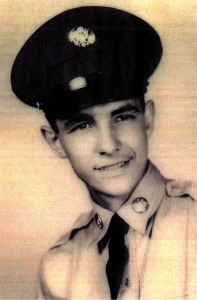
Farrell Utterback
Private First Class Ferrell Utterback was awarded the Silver Star for gallantry in action against a hostile force on 13 January 1967, while serving with a Forward Observer Team attached to Company A, 1st Battalion, 28th Infantry. Due to technical difficulties in radio communications, friendly artillery fire was directed onto his unit’s position. With complete disregard for his on personal safety, Private Utterback left his sheltered position and ran through devastating fire to reach a radio-telephone position so he could call a request for a cease fire. During the run he was wounded by the artillery barrage. Ignoring his wounds and pain he crawled the last 50 meters to reach the radio-telephone position and called for the cease fire. When helicopters arrived to treat and medically evacuate the wounded, Private Utterback refused treatment and evacuation for himself while he assisted in administering first aid to his wounded comrades and then assisted in loading them aboard the evacuation helicopters. Only when the last casualty was treated and loaded for evacuation did he accept medical assistance and evacuation. Private Utterback’s unquestionable valor while engaged in military operations involving armed conflict with an insurgent force is in keeping with the highest traditions of the military service and reflects great credit upon himself, the 1st Infantry Division and the United States Army.
Private First Class Ferrell Utterback was awarded the Silver Star for gallantry in action against a hostile force on 13 January 1967, while serving with a Forward Observer Team attached to Company A, 1st Battalion, 28th Infantry. Due to technical difficulties in radio communications, friendly artillery fire was directed onto his unit’s position. With complete disregard for his on personal safety, Private Utterback left his sheltered position and ran through devastating fire to reach a radio-telephone position so he could call a request for a cease fire. During the run he was wounded by the artillery barrage. Ignoring his wounds and pain he crawled the last 50 meters to reach the radio-telephone position and called for the cease fire. When helicopters arrived to treat and medically evacuate the wounded, Private Utterback refused treatment and evacuation for himself while he assisted in administering first aid to his wounded comrades and then assisted in loading them aboard the evacuation helicopters. Only when the last casualty was treated and loaded for evacuation did he accept medical assistance and evacuation. Private Utterback’s unquestionable valor while engaged in military operations involving armed conflict with an insurgent force is in keeping with the highest traditions of the military service and reflects great credit upon himself, the 1st Infantry Division and the United States Army.
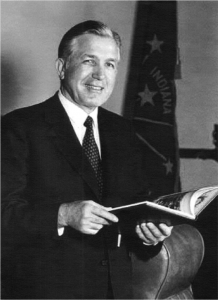
Edgar D. Whitcomb
Colonel Edgar D. Whitcomb enrolled in Indiana University in 1939 to study law but quit to enlist in the Army in 1940. He was commissioned as a 2nd Lieutenant in 1941 and deployed to the Pacific Theater as an aerial navigator. He served two tours of duty in the Philippines and was promoted to 1st Lieutenant. During the Philippine Campaign, his base was overrun and he was taken prisoner by the Japanese. He was held as a prisoner in the Philippine Islands and beaten and tortured. Lieutenant Whitcomb escaped from the prison camp but was recaptured and returned to the camp. He made a second escape and evaded his trackers for several days until he was able to swim, through shark infested waters, to an island uninhabited by the Japanese. From that island he was able to catch a ride on a tramp steamer headed for China. After reaching China he managed to be repatriated and returned to the United States. Ed Whitcomb was discharged from active duty in 1946 but remained in the Reserves until 1977 when he retired in the rank of Colonel. Ed Whitcomb passed the Bar Exam in 1954 and began a private law practice, first in Vernon then in Seymour and Indianapolis. He was elected Secretary of State in 1966 and Governor in 1968. Governor Whitcomb left office and returned to private law practice in 1973. Governor Whitcomb is the author of at least three books, Escape from Corregidor, about his experiences as a POW, Cilin II: A solo sailing odyssey, and On Celestial Wings, published in 1995. He continues to provide mentorship and support to veterans and friends across Indiana.
Colonel Edgar D. Whitcomb enrolled in Indiana University in 1939 to study law but quit to enlist in the Army in 1940. He was commissioned as a 2nd Lieutenant in 1941 and deployed to the Pacific Theater as an aerial navigator. He served two tours of duty in the Philippines and was promoted to 1st Lieutenant. During the Philippine Campaign, his base was overrun and he was taken prisoner by the Japanese. He was held as a prisoner in the Philippine Islands and beaten and tortured. Lieutenant Whitcomb escaped from the prison camp but was recaptured and returned to the camp. He made a second escape and evaded his trackers for several days until he was able to swim, through shark infested waters, to an island uninhabited by the Japanese. From that island he was able to catch a ride on a tramp steamer headed for China. After reaching China he managed to be repatriated and returned to the United States. Ed Whitcomb was discharged from active duty in 1946 but remained in the Reserves until 1977 when he retired in the rank of Colonel. Ed Whitcomb passed the Bar Exam in 1954 and began a private law practice, first in Vernon then in Seymour and Indianapolis. He was elected Secretary of State in 1966 and Governor in 1968. Governor Whitcomb left office and returned to private law practice in 1973. Governor Whitcomb is the author of at least three books, Escape from Corregidor, about his experiences as a POW, Cilin II: A solo sailing odyssey, and On Celestial Wings, published in 1995. He continues to provide mentorship and support to veterans and friends across Indiana.
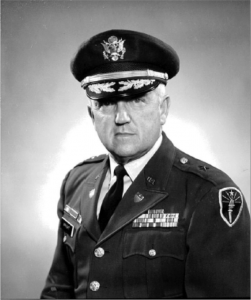
Clyde C. Wright
Brigadier General Clyde Wright enlisted into the United States Army in 1936 at the age of 18. He was promoted through all enlisted ranks and appointed as a Warrant Officer as he continued to serve. Upon separation from the active Army in January 1946, Clyde Wright joined the Indiana National Guard and was appointed with a commission as a Second Lieutenant. He continued his career in the Indiana National Guard finally reaching the rank of Brigadier General and serving as the State’s Assistant Adjutant General. In his civilian life General Wright continued to provide support and leadership to military and veterans across the state of Indiana. He has been associated with the Blue Star Program in Indiana for over ten years. During this time he has been an inspiration and provided comfort to the many military families he has met and supported. He continues to provide service to Hoosier veterans and their families through his outstanding attitude, patriotism, and the same moral keenness which have always defined him as an ideal leader. General Wright’s decorations and awards include the Legion of Merit, Bronze Star, Meritorious Service Medal, Army Commendation Medal, Distinguished Hoosier Award, Legion of Hoosier Heroes, two awards of the Sagamore of the Wabash and numerous service and campaign medals.
Brigadier General Clyde Wright enlisted into the United States Army in 1936 at the age of 18. He was promoted through all enlisted ranks and appointed as a Warrant Officer as he continued to serve. Upon separation from the active Army in January 1946, Clyde Wright joined the Indiana National Guard and was appointed with a commission as a Second Lieutenant. He continued his career in the Indiana National Guard finally reaching the rank of Brigadier General and serving as the State’s Assistant Adjutant General. In his civilian life General Wright continued to provide support and leadership to military and veterans across the state of Indiana. He has been associated with the Blue Star Program in Indiana for over ten years. During this time he has been an inspiration and provided comfort to the many military families he has met and supported. He continues to provide service to Hoosier veterans and their families through his outstanding attitude, patriotism, and the same moral keenness which have always defined him as an ideal leader. General Wright’s decorations and awards include the Legion of Merit, Bronze Star, Meritorious Service Medal, Army Commendation Medal, Distinguished Hoosier Award, Legion of Hoosier Heroes, two awards of the Sagamore of the Wabash and numerous service and campaign medals.
